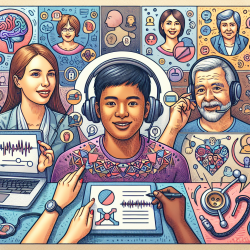Introduction
The COVID-19 pandemic has been a catalyst for change in many areas of life, including the way we interact with each other. A recent study titled "'When you give kindness out, you get it back ten times more': Ontario adults’ prosocial behaviour during the first 16 months of the COVID-19 pandemic" explores the shifts in prosocial behavior during this challenging time. As practitioners in speech-language pathology, understanding these changes can enhance our practice, particularly when working with children.
The Power of Kindness
The study reveals that prosocial behaviors, including acts of kindness, significantly increased during the pandemic's early stages. However, awareness and engagement in deliberate acts of kindness decreased over time. This trend suggests that while people initially rallied together, the prolonged stress of the pandemic led to a decline in visible acts of kindness.
For practitioners, this insight is invaluable. It underscores the importance of fostering an environment where kindness is not just encouraged but actively practiced. In therapy settings, particularly with children, integrating kindness can lead to improved outcomes. Children are highly perceptive and often mirror the behaviors they observe. By modeling kindness, therapists can encourage children to adopt similar behaviors, promoting a positive and supportive environment.
Implementing Kindness in Practice
Here are some strategies to incorporate kindness into your therapy practice:
- Model Kindness: Demonstrate acts of kindness during sessions. This could be as simple as offering a compliment or showing empathy towards a child's feelings.
- Create a Kindness Wall: Encourage children to share kind acts they have done or received. This can be a physical wall in the therapy room or a virtual space for online sessions.
- Kindness Challenges: Introduce weekly kindness challenges where children are encouraged to perform a kind act and share their experiences in the next session.
- Storytelling: Use stories that highlight kindness and empathy. Discuss these stories with the children to reinforce the importance of these behaviors.
Encouraging Further Research
The study also highlights the need for ongoing research into prosocial behaviors and their impact on mental health and wellbeing. As practitioners, staying informed about the latest research can help refine our approaches and improve outcomes for the children we work with. Consider collaborating with researchers or participating in studies that explore the intersection of kindness, mental health, and therapy.
Conclusion
Incorporating kindness into therapy not only benefits the children we work with but also enhances our practice as therapists. By understanding and applying the findings from the study, we can create a more supportive and effective therapeutic environment. Remember, when you give kindness out, you truly do get it back ten times more.
To read the original research paper, please follow this link: 'When you give kindness out, you get it back ten times more': Ontario adults’ prosocial behaviour during the first 16 months of the COVID-19 pandemic.










